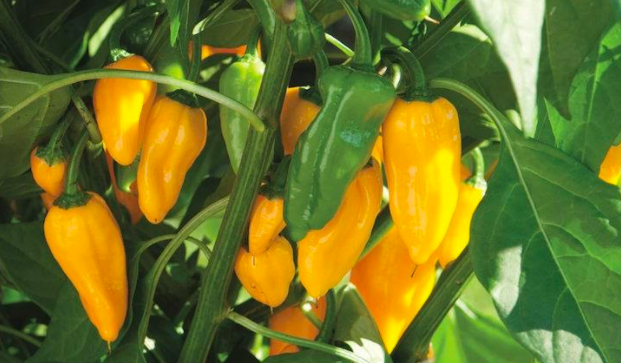
-Dan Toot-
We’ve seen the labels in the grocery store, and maybe we’ve looked into the overall benefits of organic growing, but many of us have not put it into practice ourselves. This may be especially true for those of us living in an apartment. But as quarantine encourages us to lean into our hobbies and interests, even an apartment dweller like me can dip their toes into the soil of organic gardening and understand firsthand the allure and benefits of growing organically. I got my hands on some Golden Ghost Pepper seedlings earlier this season and, as a first timer, I thought it might be helpful to share my first pass at growing. It’s easy to get started, if you keep a few criteria in mind:
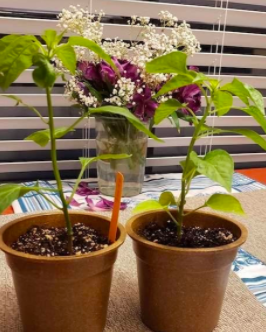
Space and Light
Without yard space, you’ll find that you spend a lot more time thinking about where your windows are facing, and the amount of sunlight your space will get. This is especially important for peppers, as they are sun-lovers. As luck would have it, my balcony is positioned such that it gets a good 6-plus hours of sun during the day. Perfect for our spicy friends. But how much room do they need? Luckily, in containers, the peppers can really keep to themselves and be perfectly happy. No need to worry about spacing your plants or crowding a raised bed. Fifth Season has a huge range of terra cotta pots, so I went with a couple 12in. pots to give the peppers a roomy home as they grew.
Soil
Apartment life can often mean a very …. strained relationship with storage space. We can’t often just have a bag of potting soil sitting around for when we need it. So it can be helpful to do a bit of math. What’s the volume of the containers you’ll be planting in? How much soil will that require? It may mean a little mental effort, but it’ll allow you to dial in more specific amounts so you’re not worried about keeping a bag of dirt in your coat closet. Don’t worry fellow math-o-phobes, there are several Soil Amount Calculators you can find online with a quick search.
Wanting to keep it organic (and really, why wouldn’t you)? Keep an eye out for the OMRI Listed certification on the bag. Fifth Season has several reliable organic soil options to choose from:
- Sunshine Organic Mix
- McEnroe
- Black Gold Natural and Organic to name just a few.
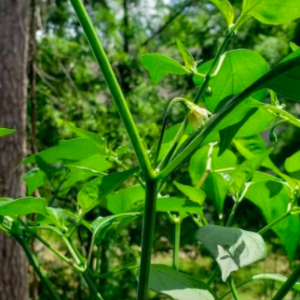
Plant food for the first-timer
Our little seedlings can often take off like a rocket at first, happy to be taken from their nursery confinement to a more spacious arrangement in your home garden. You’ll even start to see those first few blossoms. Exciting! But those little friends should be pinched off if you really want your plants to produce. Pinching the first blossoms of the plant will help the plant focus on growth, rather than switching its focus to production too early. The result will be a more robust plant with a far larger yield in the end.
With the proper feeding of course.
For the novice gardener, you’ll read/hear people referring to the NPK content of fertilizers. This refers to Nitrogen (N), Phosphorus (P), and Potassium (K) which are key nutrients needed in a plant’s growth cycle. Nitrogen is a key component in chlorophyll and amino acid production that allows the plant to grow, phosphorus is a key nutrient for blossom and fruit production, and potassium is essential for proper root development. This is, of course, extremely oversimplified, but it helps when you’re looking to address important moments in your plants’ growth. There will come a moment when you want to turn that healthy growing plant into a production superhero.
For this, I highly recommend a plant food with a good amount of phosphorus. To keep things organic, I opted for our Roots Organic Uprising: Bloom fertilizer. This provides the plants with the natural, phosphorus-rich food it needs to go into production mode.
Just follow the instructions on the bag for the size of the container you’re using, and the apartment-dweller’s advantage is that a little will go quite a long way for you! Win/Win!
Pests
This is where rubber meets road for many folks gardening organically. We apartment dwellers are not exempt from the ubiquitous menace of pests, and in such confined space, often with young ones, or pets sharing that space, the risk of what we use in our garden becomes much clearer. Additionally for the organic gardener, it’s a bit hard to encourage beneficial insects to take up residency on your porch or stoop. So what to do?
Plenty! When I saw that my fledgling Ghost plant was visited by aphids, I checked the shelf for organic solutions and was surprised at how robust pest control has become for organic gardening. Safer brand makes an Insect Killing Soap that works wonders on those little rascals. With repeated treatments, I was soon free of them and able to watch the tiny magma-hot fruits begin to appear. I’ll still flick the occasional leaf hopper off a stem or branch, but the plant is otherwise healthy and happy.
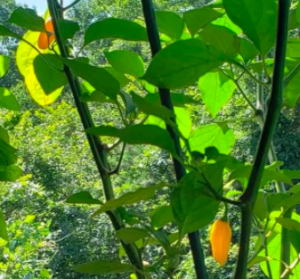
Harvest Time!
Before you know it, those Golden Ghost peppers are living up to their name, providing a bunch of sun-fire yellow fruits that are ready to intimidate even the most adventurous palate. So let’s get our first harvest! Be sure, however, to wear protective gloves, as even when harvesting these peppers can leave their potent capsaicin on your hands. We’re all getting pretty good at not touching our faces, so it shouldn’t be too hard!
Next Steps:
All right. If you’re like me, you took the challenge of GROWING these things. Now what do you DO with them? A spice fan will know that a little goes a LONG way when you’re talking Superhot pepper varieties. I’m not trying to go viral on YouTube, so eating them raw is out of the question. What else is there? Well my homebrewer brain led me to our fermentation section, where I realized the situation was perfect for a blazing fermented probiotic hot sauce. Using one of our 32oz Fermentation Kits (handy because it comes with a grommeted lid and airlock), I assembled a mix of my tiny fiery friends, with some more friendly New Mexico Red Chiles, Carrot, Shallots, Turmeric, Ginger and Parsley and am now giving them a good long sit in brine to develop the tang that fermented hot sauces are known for. Stay tuned for the full recipe!
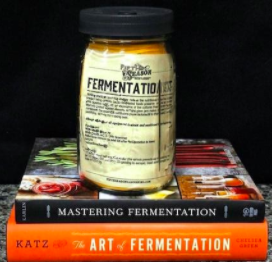
So there we are! Not bad for a first pass, I’d say. As any first-timer will tell you, it’s intimidating to jump into a new hobby, especially in the internet age where a lot of unnecessary judgement can be thrown your way for trying new things. Lucky for me, and lucky for us, Fifth Season is a welcoming place, and my coworkers were only too happy to lend their expertise. So let this be an invitation! If you’ve been thinking about making the plunge, come on in. The water is fine!

Leave a Reply